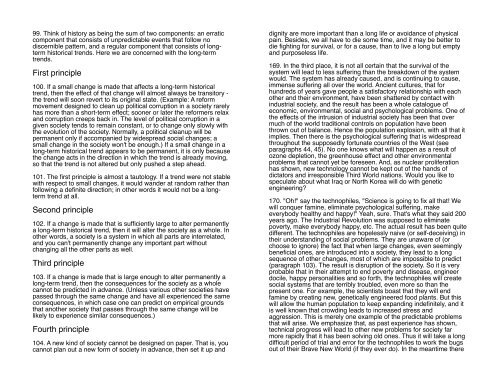Unabomber Manifesto - ouroboros ponderosa
Unabomber Manifesto - ouroboros ponderosa
Unabomber Manifesto - ouroboros ponderosa
You also want an ePaper? Increase the reach of your titles
YUMPU automatically turns print PDFs into web optimized ePapers that Google loves.
99. Think of history as being the sum of two components: an erraticcomponent that consists of unpredictable events that follow nodiscernible pattern, and a regular component that consists of longtermhistorical trends. Here we are concerned with the long-termtrends.First principle100. If a small change is made that affects a long-term historicaltrend, then the effect of that change will almost always be transitory -the trend will soon revert to its original state. (Example: A reformmovement designed to clean up political corruption in a society rarelyhas more than a short-term effect; sooner or later the reformers relaxand corruption creeps back in. The level of political corruption in agiven society tends to remain constant, or to change only slowly withthe evolution of the society. Normally, a political cleanup will bepermanent only if accompanied by widespread social changes; asmall change in the society won't be enough.) If a small change in along-term historical trend appears to be permanent, it is only becausethe change acts in the direction in which the trend is already moving,so that the trend is not altered but only pushed a step ahead.101. The first principle is almost a tautology. If a trend were not stablewith respect to small changes, it would wander at random rather thanfollowing a definite direction; in other words it would not be a longtermtrend at all.Second principle102. If a change is made that is sufficiently large to alter permanentlya long-term historical trend, then it will alter the society as a whole. Inother words, a society is a system in which all parts are interrelated,and you can't permanently change any important part withoutchanging all the other parts as well.Third principle103. If a change is made that is large enough to alter permanently along-term trend, then the consequences for the society as a wholecannot be predicted in advance. (Unless various other societies havepassed through the same change and have all experienced the sameconsequences, in which case one can predict on empirical groundsthat another society that passes through the same change will belikely to experience similar consequences.)Fourth principle104. A new kind of society cannot be designed on paper. That is, youcannot plan out a new form of society in advance, then set it up anddignity are more important than a long life or avoidance of physicalpain. Besides, we all have to die some time, and it may be better todie fighting for survival, or for a cause, than to live a long but emptyand purposeless life.169. In the third place, it is not all certain that the survival of thesystem will lead to less suffering than the breakdown of the systemwould. The system has already caused, and is continuing to cause,immense suffering all over the world. Ancient cultures, that forhundreds of years gave people a satisfactory relationship with eachother and their environment, have been shattered by contact withindustrial society, and the result has been a whole catalogue ofeconomic, environmental, social and psychological problems. One ofthe effects of the intrusion of industrial society has been that overmuch of the world traditional controls on population have beenthrown out of balance. Hence the population explosion, with all that itimplies. Then there is the psychological suffering that is widespreadthroughout the supposedly fortunate countries of the West (seeparagraphs 44, 45). No one knows what will happen as a result ofozone depletion, the greenhouse effect and other environmentalproblems that cannot yet be foreseen. And, as nuclear proliferationhas shown, new technology cannot be kept out of the hands ofdictators and irresponsible Third World nations. Would you like tospeculate about what Iraq or North Korea will do with geneticengineering?170. "Oh!" say the technophiles, "Science is going to fix all that! Wewill conquer famine, eliminate psychological suffering, makeeverybody healthy and happy!" Yeah, sure. That's what they said 200years ago. The Industrial Revolution was supposed to eliminatepoverty, make everybody happy, etc. The actual result has been quitedifferent. The technophiles are hopelessly naive (or self-deceiving) intheir understanding of social problems. They are unaware of (orchoose to ignore) the fact that when large changes, even seeminglybeneficial ones, are introduced into a society, they lead to a longsequence of other changes, most of which are impossible to predict(paragraph 103). The result is disruption of the society. So it is veryprobable that in their attempt to end poverty and disease, engineerdocile, happy personalities and so forth, the technophiles will createsocial systems that are terribly troubled, even more so than thepresent one. For example, the scientists boast that they will endfamine by creating new, genetically engineered food plants. But thiswill allow the human population to keep expanding indefinitely, and itis well known that crowding leads to increased stress andaggression. This is merely one example of the predictable problemsthat will arise. We emphasize that, as past experience has shown,technical progress will lead to other new problems for society farmore rapidly that it has been solving old ones. Thus it will take a longdifficult period of trial and error for the technophiles to work the bugsout of their Brave New World (if they ever do). In the meantime there






